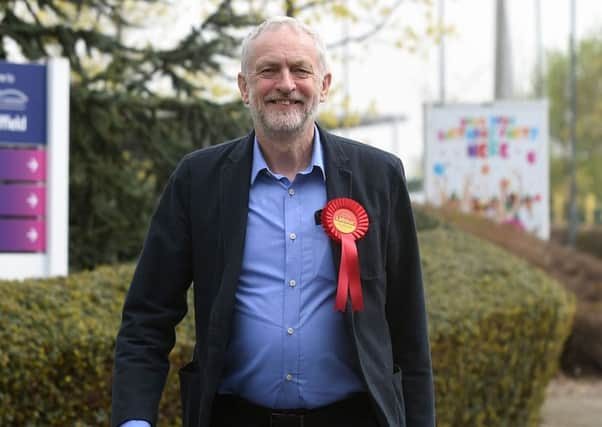Questions over Jeremy Corbyn's leadership after mixed fortunes for Labour


The Labour leader brushed off suggestions his position was under threat despite seeing the party crash to third place in Scotland, lose its overall majority in the Welsh Assembly and fail to make gains in England.
But while there appeared to be no mood among Labour MPs for an immediate move against him, shadow Scottish secretary Ian Murray said the leadership had to reflect on the results and the implications for its chances in the 2020 general election.
Advertisement
Hide AdAdvertisement
Hide Ad“I don’t think that the public see the UK Labour Party led by Jeremy Corbyn at the moment as being a credible party of future government in 2020,” Mr Murray, Labour’s only MP in Scotland, said.
“That’s something, after this week’s results, we should reflect on – the leadership of the party should reflect on – and find a way of finding a strategy and a narrative that changes the perception of the UK Labour Party across the United Kingdom so that we can go on and have a real shot at winning in 2020.”
His comments reflected deep unhappiness among MPs opposed to Mr Corbyn’s left-wing agenda, but his position was bolstered by Tom Watson, Labour’s influential deputy leader, who warned critics to show “patience”.
“I think even our opponents who are not members of the Labour Party would say that after eight months it would be very unfair and improper, actually, to hang this set of election results on Jeremy Corbyn’s peg alone,” he told the BBC.
With the overwhelming majority of grass roots members still strongly behind the leader, his close ally, shadow chancellor John McDonnell, said it was time for the “begrudgers” in the party to “put up or shut up”.
Addressing supporters in Sheffield, Mr Corbyn admitted the party has “a lot of building to do” in Scotland but brushed aside suggestions that he should stand down.
Over the course of the night in England Labour lost control of Dudley Council in the West Midlands, but held on to major cities including Birmingham, Newcastle-upon-Tyne and Sunderland, as well as key southern outposts such as Exeter, Southampton, Crawley and Slough.
The Conservatives lost overall control of Worcester but secured an absolute majority in Peterborough and Ukip gained seats in Thurrock, Tamworth and Bolton while securing its first representation in the Welsh Assembly.
Advertisement
Hide AdAdvertisement
Hide AdIn Wales, Labour lost its overall majority in the Assembly, with the totemic Rhondda seat falling to Plaid Cymru leader Leanne Wood.
Earlier – in a move seen as a sign of his unhappiness with the leadership – shadow home secretary Andy Burnham disclosed that he was considering running for mayor of Manchester, potentially giving him a chance to build up his own powerbase.
In Northern Ireland, where final results will be announced today, Democratic Unionist leader Arlene Foster has expressed confidence she will be returned as Northern Ireland’s first minister. As the votes continue to be counted across Northern Ireland, Mrs Foster said her party was on course to again emerge as the region’s largest party.
“I am confident that I will be the first minister of Northern Ireland,” she said after topping the poll in Fermanagh and South Tyrone.
As of yesterday evening, 21 of the 108 Assembly seats were filled. The Democratic Unionists had won nine, Sinn Fein eight, with one each for the Ulster Unionists, SDLP, Alliance Party and People Before Profit Alliance.